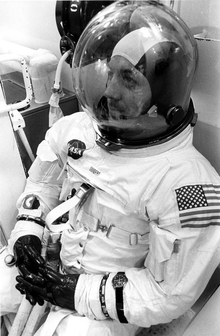Jack Swigert
| John L. Swigert, Jr. | |
|---|---|
 | |
| NASA Astronaut | |
| Nationality | American |
| Status | Deceased |
| Born |
August 30, 1931 Denver, Colorado, U.S. |
| Died |
December 27, 1982 (aged 51) Washington D.C., U.S. |
| Other names | John Leonard Swigert, Jr. |
| Other occupation | Test pilot |
| Alma mater |
CU, B.S. 1953 RPI, M.S. 1965 UHart, MBA 1967 |
| Time in space | 5d 22h 54m 16s |
| Selection | 1966 NASA Group |
| Missions | Apollo 13 |
| Mission insignia |
|
| Retirement | August, 1977 |
John Leonard "Jack" Swigert, Jr. (August 30, 1931 – December 27, 1982) was a NASA astronaut, one of the 24 persons who have flown to the Moon.
Before joining NASA, Swigert was a test pilot. After leaving NASA, he was elected to the United States House of Representatives for Colorado's 6th congressional district, but died before being sworn in.
Education
Swigert was born and raised in Denver, Colorado. He attended Blessed Sacrament School, Regis Jesuit High School, and East High School, from which he graduated. Swigert received a Bachelor of Science degree in Mechanical engineering from the University of Colorado in 1953, a Master of Science degree in Aerospace engineering from the Rensselaer Polytechnic Institute in 1965, and a Master of Business Administration degree from the University of Hartford in 1967; and was presented an Honorary Doctorate of Science degree from American International College in 1970, and an Honorary Doctorate of Laws degree from Western State University in 1970, and an Honorary Doctorate of Science from Western Michigan University in 1970.[1]
Astronaut

After unsuccessfully applying for NASA's second and third astronaut selections,[2] Swigert was accepted into the astronaut corps as part of NASA Astronaut Group 5 in April 1966. Swigert became a specialist on the Apollo command module: he was one of the few astronauts who requested to be command-module pilots.[2]
Swigert was one of three astronauts aboard the ill-fated Apollo 13 moon mission launched April 11, 1970. Originally part of the backup crew for the mission, he was assigned to the mission three days before launch, replacing astronaut Ken Mattingly. The prime crew had been exposed to German Measles (the rubella virus) and, because he had no immunity to the disease, NASA did not want to risk his falling ill during critical phases of the flight. Incidentally, this made Swigert the first American bachelor astronaut to fly in space.
The mission was the third lunar-landing attempt, but was aborted after the rupture of an oxygen tank in the spacecraft's service module. Swigert was the astronaut who made the famous dramatic announcement, "Houston, we've had a problem here".[3] Swigert, along with fellow astronauts Jim Lovell and Fred Haise, returned safely to Earth on April 17th after about 5 days and 23 hours in space, and received the Presidential Medal of Freedom later that year.
Swigert received the NASA Distinguished Service Medal.
Death
In 1982, during his political campaign, Swigert developed a malignant tumor in his right nasal passage. He underwent surgery, but the cancer spread to his bone marrow and lungs. He was hospitalized at Yale University Hospital on 19 December, and died of respiratory failure on December 27, eight days before the beginning of his Congressional term.[2] He is buried in Mount Olivet Cemetery in Wheat Ridge, Colorado.[4]
Legacy

- In 1988, Jack Swigert was nominated and inducted into the Colorado Aviation Hall of Fame.[5]
- In 1995, Swigert was portrayed by Kevin Bacon in Ron Howard's film Apollo 13.
- In 1997, a statue of Swigert made by George and Mark Lundeen was placed on display in the US Capitol Building which as of December 2008 is on display in Emancipation Hall in the United States Capitol Visitor Center. A duplicate statue is currently on display at Denver International Airport. [6]
- In September 2003, John L. Swigert Jr. was elected to the Rensselaer Polytechnic Institute Alumni Hall of Fame [7]
John L. "Jack" Swigert, Jr., Award for Space Exploration
In 2004, the Space Foundation launched the John L. "Jack" Swigert, Jr., Award for Space Exploration, which is presented annually to an individual, group or organization that has made a significant contribution to space exploration. Based in Colorado Springs, Colo., the Space Foundation was founded in 1983 in part to honor the memory and accomplishments of Swigert. Recipients include:
- 2004 President George W. Bush
- 2005 NASA's Mars Exploration Team from the Jet Propulsion Laboratory
- 2006 NASA's Jet Propulsion Laboratory
- 2007 The California Institute of Technology
- 2008 Japan Aerospace Exploration Agency
- 2009 NASA's Phoenix Mars Lander Team
- 2010 The Lunar Crater Observation and Sensing Satellite (LCROSS) Mission Team
- 2011 No award given
- 2012 NASA Kepler Mission
- 2013 NASA Mars Science Laboratory Mission Team
References
- ↑ Jack's education .jsc.nasa.gov
- ↑ 2.0 2.1 2.2 Chaikin, Andrew. A Man on the Moon. Penguin Books Ltd. ISBN 978-0-14-024146-4.
- ↑ "Jim Lovell's written account of the mission attributes the quote to Swigert". History.nasa.gov. 1970-04-11. Retrieved 2012-09-14.
- ↑ "Find-a-grave". Retrieved 22 September 2013.
- ↑ Holmes, Charles W., Editor, Honoree Album of the Colorado Aviation Hall of Fame, The Colorado Aviation Historical Society, 1999, Audubon Media Corp., Audubon, IA.
- ↑ "Fact Sheets". Visitthecapitol.gov. Retrieved 2012-09-14.
- ↑ "RPI Alumni Hall of Fame: John L. Swigert Jr". Rpi.edu. Retrieved 2012-09-14.
External links
| Wikimedia Commons has media related to Jack Swigert. |
- NASA biography for Swigert
- Spacefacts biography of Jack Swigert
- Congressional Quarterly's Guide to U.S. Elections
- Jack Swigert on IMDb
- John L. "Jack" Swigert, Jr., Award for Space Exploration
| |||||||||||||
|